雅思A类大作文真题范文:为什么企业招聘更注重学历而非经验 2018-02-24: Australia
- 格式:doc
- 大小:18.00 KB
- 文档页数:2
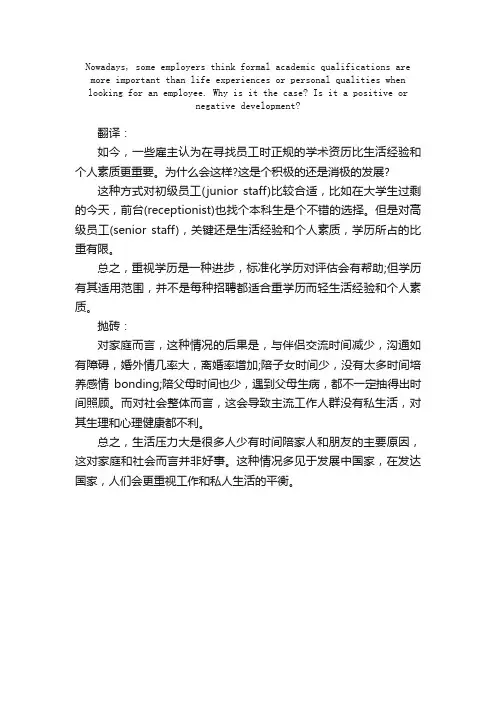
Nowadays, some employers think formal academic qualifications are more important than life experiences or personal qualities when looking for an employee. Why is it the case? Is it a positive or
negative development?
翻译:
如今,一些雇主认为在寻找员工时正规的学术资历比生活经验和个人素质更重要。
为什么会这样?这是个积极的还是消极的发展?
这种方式对初级员工(junior staff)比较合适,比如在大学生过剩的今天,前台(receptionist)也找个本科生是个不错的选择。
但是对高级员工(senior staff),关键还是生活经验和个人素质,学历所占的比重有限。
总之,重视学历是一种进步,标准化学历对评估会有帮助;但学历有其适用范围,并不是每种招聘都适合重学历而轻生活经验和个人素质。
抛砖:
对家庭而言,这种情况的后果是,与伴侣交流时间减少,沟通如有障碍,婚外情几率大,离婚率增加;陪子女时间少,没有太多时间培养感情bonding;陪父母时间也少,遇到父母生病,都不一定抽得出时间照顾。
而对社会整体而言,这会导致主流工作人群没有私生活,对其生理和心理健康都不利。
总之,生活压力大是很多人少有时间陪家人和朋友的主要原因,这对家庭和社会而言并非好事。
这种情况多见于发展中国家,在发达国家,人们会更重视工作和私人生活的平衡。
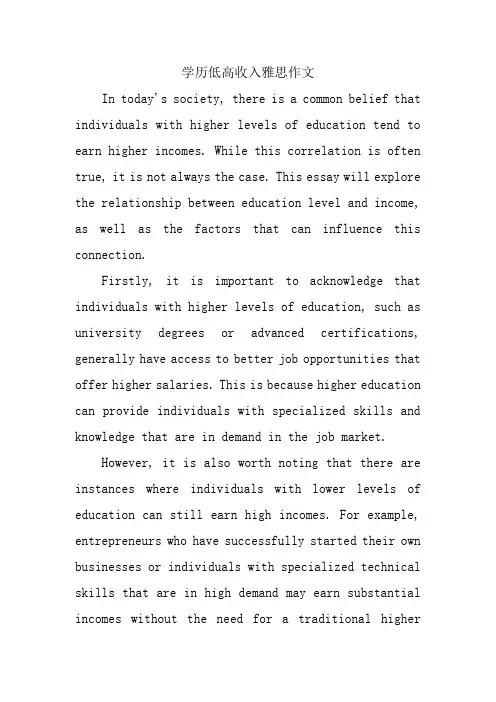
学历低高收入雅思作文In today's society, there is a common belief that individuals with higher levels of education tend to earn higher incomes. While this correlation is often true, it is not always the case. This essay will explore the relationship between education level and income, as well as the factors that can influence this connection.Firstly, it is important to acknowledge that individuals with higher levels of education, such as university degrees or advanced certifications, generally have access to better job opportunities that offer higher salaries. This is because higher education can provide individuals with specialized skills and knowledge that are in demand in the job market.However, it is also worth noting that there are instances where individuals with lower levels of education can still earn high incomes. For example, entrepreneurs who have successfully started their own businesses or individuals with specialized technical skills that are in high demand may earn substantial incomes without the need for a traditional highereducation degree.Moreover, factors such as industry, experience, and location can also play a significant role in determining income levels. Industries such as technology and finance tend to offer higher salaries, regardless of education level. Additionally, individuals with years of experience in a particular field may command higher salaries than those with higher education but less experience.In conclusion, while there is a general correlation between education level and income, it is not the sole determining factor. Other factors such as skills, experience, industry, and location can also influence income levels. Ultimately, individuals should focus on acquiring the necessary skills and experience that align with their career goals, rather than solely relying on education level to determine their income potential.中文翻译:在当今社会,有一个普遍的观念是,拥有较高学历的个体往往有更高的收入。
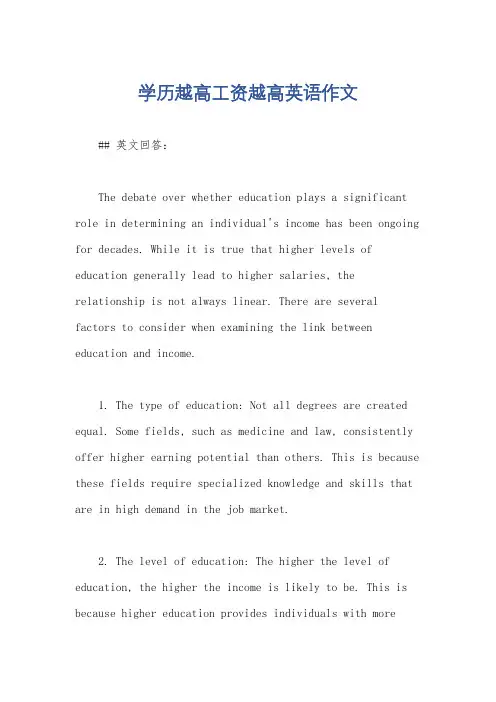
学历越高工资越高英语作文## 英文回答:The debate over whether education plays a significant role in determining an individual's income has been ongoing for decades. While it is true that higher levels of education generally lead to higher salaries, the relationship is not always linear. There are severalfactors to consider when examining the link between education and income.1. The type of education: Not all degrees are created equal. Some fields, such as medicine and law, consistently offer higher earning potential than others. This is because these fields require specialized knowledge and skills that are in high demand in the job market.2. The level of education: The higher the level of education, the higher the income is likely to be. This is because higher education provides individuals with moreadvanced knowledge and skills, which make them more valuable to employers.3. The experience: Experience is another important factor that contributes to income. Even individuals with high levels of education may not earn as much as those with less education but more experience. This is because experience provides individuals with the opportunity to develop the skills and knowledge that are necessary to succeed in the workplace.4. The location: The location of a job can also have a significant impact on income. For example, jobs in large metropolitan areas tend to pay more than those in rural areas. This is because there is more competition for jobsin large metropolitan areas, which drives up salaries.5. The individual's skills and abilities: Not all individuals with the same level of education will earn the same amount of money. This is because individuals with certain skills and abilities may be more valuable to employers than those without those skills. For example,individuals who are strong communicators, problem solvers, and team players tend to earn more than those who are not.6. The economic climate: The economic climate can also have a significant impact on income. During economic downturns, salaries tend to decrease. This is because businesses are less likely to hire new employees or give raises to existing employees.Overall, while it is true that higher levels of education generally lead to higher salaries, therelationship is not always linear. There are severalfactors to consider when examining the link between education and income, including the type of education, the level of education, the experience, the location, the individual's skills and abilities, and the economic climate.## 中文回答:学历与收入之间的关系一直备受争议。
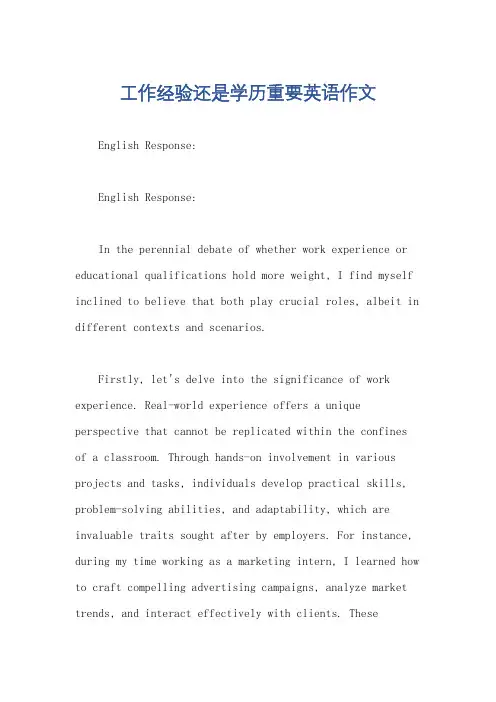
工作经验还是学历重要英语作文English Response:English Response:In the perennial debate of whether work experience or educational qualifications hold more weight, I find myself inclined to believe that both play crucial roles, albeit in different contexts and scenarios.Firstly, let's delve into the significance of work experience. Real-world experience offers a unique perspective that cannot be replicated within the confines of a classroom. Through hands-on involvement in various projects and tasks, individuals develop practical skills, problem-solving abilities, and adaptability, which are invaluable traits sought after by employers. For instance, during my time working as a marketing intern, I learned how to craft compelling advertising campaigns, analyze market trends, and interact effectively with clients. Theseexperiences not only enhanced my professional competencies but also bolstered my confidence in tackling real-world challenges.On the other hand, educational qualifications serve as a foundational pillar upon which one's career trajectory is built. A solid academic background demonstrates a commitment to learning and mastery of theoretical concepts relevant to one's field. Moreover, certain professions necessitate specific degrees or certifications as prerequisites for entry or advancement. For example, a software engineer typically requires a degree in computer science or a related field to secure employment at reputable tech companies. Additionally, formal education provides a structured framework for acquiring knowledge, fostering critical thinking skills, and cultivating a strong academic foundation that can be applied across various domains.However, it's essential to recognize that the relative importance of work experience versus educational qualifications can vary depending on the industry, role,and organizational culture. In fields such as healthcare or engineering, where technical expertise and hands-on skills are paramount, employers may prioritize practical experience over academic credentials. Conversely, in sectors like academia or research, academic qualifications and publications hold greater weight in assessing an individual's suitability for positions.Ultimately, the ideal scenario involves a harmonious blend of both work experience and educational qualifications. A candidate with a balance of theoretical knowledge and practical expertise is well-equipped to navigate the complexities of today's dynamic job market. By leveraging academic achievements to complement hands-on experience, individuals can differentiate themselves and stand out amidst competition.In conclusion, while the debate between work experience and educational qualifications continues to spark discussions, it's evident that both are integral components of professional development. By embracing opportunities to gain practical experience alongside pursuing academicexcellence, individuals can position themselves for success in their chosen career paths.中文回答:在工作经验和学历哪个更重要的永恒辩论中,我倾向于认为两者都起着至关重要的作用,尽管在不同的背景和情境下有所不同。
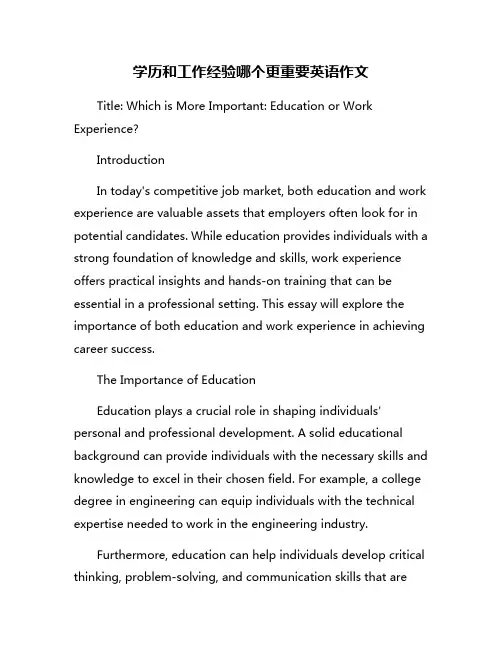
学历和工作经验哪个更重要英语作文Title: Which is More Important: Education or Work Experience?IntroductionIn today's competitive job market, both education and work experience are valuable assets that employers often look for in potential candidates. While education provides individuals with a strong foundation of knowledge and skills, work experience offers practical insights and hands-on training that can be essential in a professional setting. This essay will explore the importance of both education and work experience in achieving career success.The Importance of EducationEducation plays a crucial role in shaping individuals' personal and professional development. A solid educational background can provide individuals with the necessary skills and knowledge to excel in their chosen field. For example, a college degree in engineering can equip individuals with the technical expertise needed to work in the engineering industry.Furthermore, education can help individuals develop critical thinking, problem-solving, and communication skills that areessential in the workplace. Employers often value candidates who have a strong educational background because it demonstrates their ability to learn and adapt to new challenges.In addition, education can open doors to career opportunities and advancement. Many employers require candidates to have a certain level of education, such as a bachelor's or master's degree, in order to be considered for certain positions. Having a higher level of education can also result in better job prospects and higher earning potential.The Importance of Work ExperienceWhile education is important, work experience is equally valuable in the professional world. Work experience provides individuals with real-world skills and knowledge that cannot be gained through education alone. For example, an internship or part-time job can give individuals the opportunity to apply their academic knowledge in a practical setting and gain hands-on experience in their chosen field.Work experience also allows individuals to develop important soft skills, such as teamwork, time management, and problem-solving, which are essential in the workplace. Employers often look for candidates who have a proven track record ofsuccess in previous roles, as it demonstrates their ability to perform well in a professional setting.Furthermore, work experience can help individuals build a professional network and make valuable connections in their industry. Networking is an important aspect of career development, as it can lead to job opportunities, mentorship, and professional growth.ConclusionIn conclusion, both education and work experience are important factors in achieving career success. While education provides individuals with a strong foundation of knowledge and skills, work experience offers practical insights and hands-on training that can be essential in a professional setting. Ultimately, a combination of education and work experience can help individuals stand out in a competitive job market and pursue their career goals. It is important for individuals to continuously invest in their education and gain relevant work experience in order to advance their careers and achieve long-term success.。
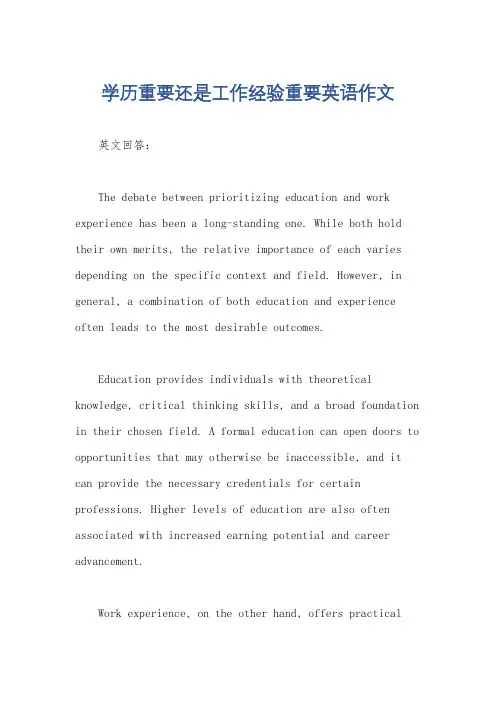
学历重要还是工作经验重要英语作文英文回答:The debate between prioritizing education and work experience has been a long-standing one. While both hold their own merits, the relative importance of each varies depending on the specific context and field. However, in general, a combination of both education and experience often leads to the most desirable outcomes.Education provides individuals with theoretical knowledge, critical thinking skills, and a broad foundation in their chosen field. A formal education can open doors to opportunities that may otherwise be inaccessible, and it can provide the necessary credentials for certain professions. Higher levels of education are also often associated with increased earning potential and career advancement.Work experience, on the other hand, offers practicalskills and knowledge that cannot be fully replicated in a classroom setting. It allows individuals to apply their theoretical learning in real-world scenarios, develop hands-on skills, and build a professional network. Experience can also provide valuable insights into the industry and specific roles, helping individuals make informed career decisions.The ideal balance between education and experience depends on the individual's career goals and the specific industry. For some roles, such as those in academia or research, a higher level of education may be more heavily weighted. In other fields, such as many technical or trade professions, work experience may be more highly valued.In today's competitive job market, it is increasingly important to possess both education and experience. A strong educational foundation provides a solid theoretical base, while relevant work experience demonstrates practical skills and a commitment to the field. By pursuing a balance between these two aspects, individuals can increase their chances of career success and personal fulfillment.中文回答:教育和工作经验孰轻孰重一直是一个备受争论的话题。
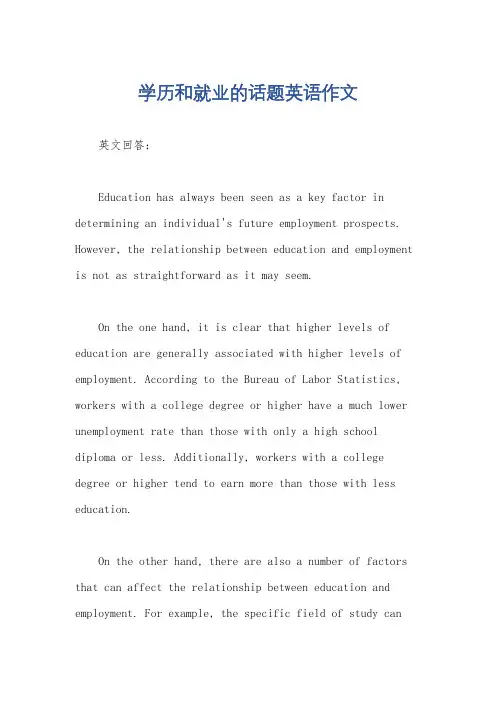
学历和就业的话题英语作文英文回答:Education has always been seen as a key factor in determining an individual's future employment prospects. However, the relationship between education and employment is not as straightforward as it may seem.On the one hand, it is clear that higher levels of education are generally associated with higher levels of employment. According to the Bureau of Labor Statistics, workers with a college degree or higher have a much lower unemployment rate than those with only a high school diploma or less. Additionally, workers with a college degree or higher tend to earn more than those with less education.On the other hand, there are also a number of factors that can affect the relationship between education and employment. For example, the specific field of study canhave a significant impact on employment prospects. Workers with degrees in high-demand fields, such as engineering or computer science, are more likely to find employment than those with degrees in less-demand fields. Additionally, the location of a job can also affect employment prospects. Workers in large metropolitan areas are more likely to find employment than those in rural areas.Furthermore, the relationship between education and employment has changed over time. In the past, a college degree was often seen as a guarantee of a good job. However, in recent years, the job market has become more competitive, and workers with only a college degree may find itdifficult to find employment. As a result, many workers are now pursuing graduate degrees or other forms of higher education in order to improve their employment prospects.The relationship between education and employment is complex and multifaceted. While higher levels of education are generally associated with higher levels of employment, there are a number of other factors that can affect the relationship. As a result, it is important for individualsto carefully consider their educational options and to choose a field of study that is in high demand.中文回答:学历与就业。
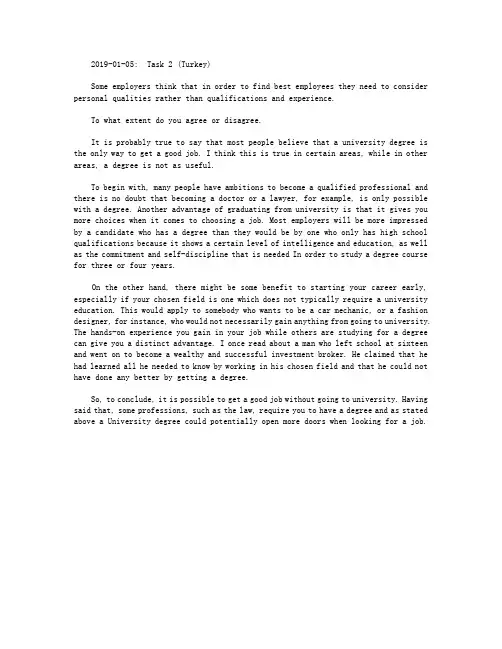
2019-01-05: Task 2 (Turkey)Some employers think that in order to find best employees they need to consider personal qualities rather than qualifications and experience.To what extent do you agree or disagree.It is probably true to say that most people believe that a university degree is the only way to get a good job. I think this is true in certain areas, while in other areas, a degree is not as useful.To begin with, many people have ambitions to become a qualified professional and there is no doubt that becoming a doctor or a lawyer, for example, is only possible with a degree. Another advantage of graduating from university is that it gives you more choices when it comes to choosing a job. Most employers will be more impressed by a candidate who has a degree than they would be by one who only has high school qualifications because it shows a certain level of intelligence and education, as well as the commitment and self-discipline that is needed In order to study a degree course for three or four years.On the other hand, there might be some benefit to starting your career early, especially if your chosen field is one which does not typically require a university education. This would apply to somebody who wants to be a car mechanic, or a fashion designer, for instance, who would not necessarily gain anything from going to university. The hands-on experience you gain in your job while others are studying for a degree can give you a distinct advantage. I once read about a man who left school at sixteen and went on to become a wealthy and successful investment broker. He claimed that he had learned all he needed to know by working in his chosen field and that he could not have done any better by getting a degree.So, to conclude, it is possible to get a good job without going to university. Having said that, some professions, such as the law, require you to have a degree and as stated above a University degree could potentially open more doors when looking for a job.。
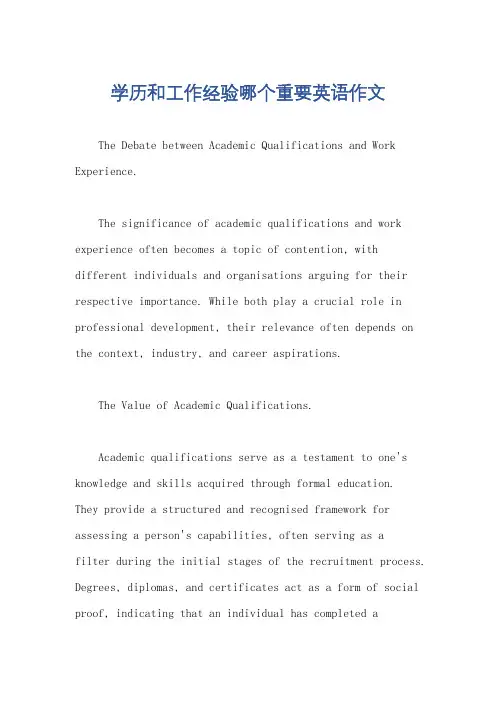
学历和工作经验哪个重要英语作文The Debate between Academic Qualifications and Work Experience.The significance of academic qualifications and work experience often becomes a topic of contention, withdifferent individuals and organisations arguing for their respective importance. While both play a crucial role in professional development, their relevance often depends on the context, industry, and career aspirations.The Value of Academic Qualifications.Academic qualifications serve as a testament to one's knowledge and skills acquired through formal education.They provide a structured and recognised framework for assessing a person's capabilities, often serving as afilter during the initial stages of the recruitment process. Degrees, diplomas, and certificates act as a form of social proof, indicating that an individual has completed acertain level of education and met specific standards.Moreover, academic qualifications can open doors to better job opportunities. Many organisations and industries prefer candidates with specific qualifications, as they provide a guarantee of a certain level of expertise. For instance, certain professions such as law or medicine require mandatory qualifications before an individual can practise.Additionally, academic qualifications contribute to career advancement. They can act as a catalyst for promotions and salary increments, as employers often view them as indicators of an employee's commitment to professional development.The Importance of Work Experience.Work experience, on the other hand, provides practical knowledge and skills that are often difficult to acquire solely through academic learning. It exposes individuals to real-world scenarios and challenges, allowing them to applytheir theoretical knowledge to practical situations.Work experience also enhances one's problem-solving abilities and critical thinking skills. It teaches individuals how to navigate complex work environments, manage pressure, and make informed decisions. Moreover, it provides an opportunity to build professional relationships and networks, which can be invaluable in one's career.Furthermore, work experience often acts as a bridge between academic qualifications and career success. It gives employers a sense of an individual's adaptability, work ethic, and commitment to their field. In many cases, work experience may even outweigh academic qualifications, especially in fields that are highly dependent on practical skills and industry knowledge.Balancing Academic Qualifications and Work Experience.While academic qualifications and work experience each have their unique benefits, it is essential to strike a balance between the two. Depending on one's career goalsand aspirations, one may need to prioritise one over the other.For instance, those seeking entry-level positions in a particular industry may benefit more from acquiringrelevant work experience, as it can provide them with a competitive edge. On the other hand, those aiming forhigher-level positions or seeking to specialise in a particular field may need to focus more on academic qualifications.Moreover, individuals can leverage both academic qualifications and work experience to further their careers. For example, they can use their academic knowledge to contribute to industry discussions and research, while leveraging their work experience to implement practical solutions.Conclusion.In summary, the debate between academic qualifications and work experience is not a matter of either-or, butrather a question of balance and context. Both have their unique value and importance, and it is up to individuals to determine which one best suits their career aspirations and goals. In today's rapidly changing world, it isincreasingly becoming essential to have a blend of both academic and practical skills to ensure professional success and growth.。
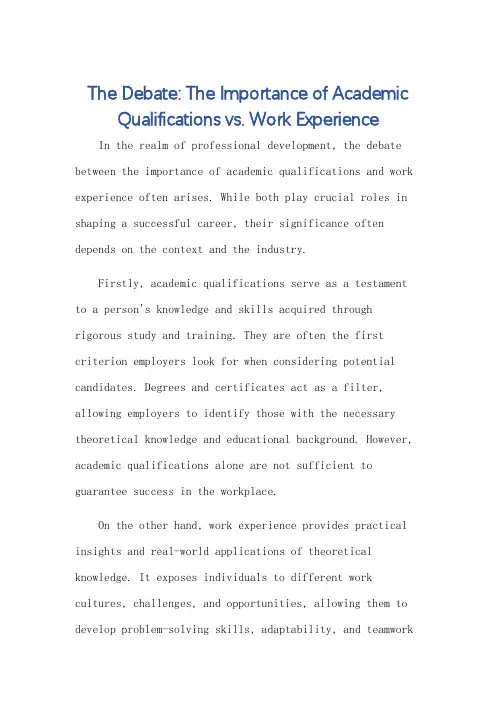
The Debate: The Importance of Academic Qualifications vs. Work ExperienceIn the realm of professional development, the debate between the importance of academic qualifications and work experience often arises. While both play crucial roles in shaping a successful career, their significance often depends on the context and the industry.Firstly, academic qualifications serve as a testament to a person's knowledge and skills acquired through rigorous study and training. They are often the first criterion employers look for when considering potential candidates. Degrees and certificates act as a filter, allowing employers to identify those with the necessary theoretical knowledge and educational background. However, academic qualifications alone are not sufficient to guarantee success in the workplace.On the other hand, work experience provides practical insights and real-world applications of theoretical knowledge. It exposes individuals to different work cultures, challenges, and opportunities, allowing them to develop problem-solving skills, adaptability, and teamworkabilities. Work experience is often valued highly by employers as it demonstrates a candidate's ability to apply their knowledge in real-time scenarios and learn from their mistakes.The significance of academic qualifications and work experience varies depending on the industry. In some fields, such as healthcare or law, academic qualifications are paramount as they require a deep understanding of complex theories and principles. However, in other industries like marketing or entrepreneurship, work experience might hold more weight as it demonstrates a candidate's ability to navigate dynamic environments and achieve results.Moreover, the role of academic qualifications and work experience changes over time. In the early stages of a career, academic qualifications might be more important as they act as a stepping stone into the job market. However, as one's career progresses, work experience becomes increasingly valuable as it builds trust and credibility within the industry.In conclusion, both academic qualifications and work experience play integral roles in career development. Whileacademic qualifications provide a solid foundation of theoretical knowledge, work experience complements it by offering practical applications and real-world insights.The debate between their importance often depends on the context and the industry, making it crucial for individuals to assess their career goals and the demands of their chosen field when prioritizing between the two.**学历与工作经验的重要性:孰轻孰重?**在职业发展中,学历和工作经验的重要性常常引发人们的讨论。
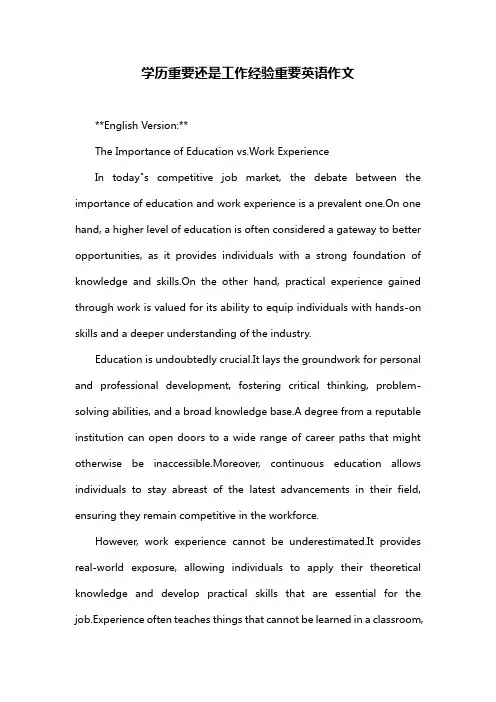
学历重要还是工作经验重要英语作文**English Version:**The Importance of Education vs.Work ExperienceIn today"s competitive job market, the debate between the importance of education and work experience is a prevalent one.On one hand, a higher level of education is often considered a gateway to better opportunities, as it provides individuals with a strong foundation of knowledge and skills.On the other hand, practical experience gained through work is valued for its ability to equip individuals with hands-on skills and a deeper understanding of the industry.Education is undoubtedly crucial.It lays the groundwork for personal and professional development, fostering critical thinking, problem-solving abilities, and a broad knowledge base.A degree from a reputable institution can open doors to a wide range of career paths that might otherwise be inaccessible.Moreover, continuous education allows individuals to stay abreast of the latest advancements in their field, ensuring they remain competitive in the workforce.However, work experience cannot be underestimated.It provides real-world exposure, allowing individuals to apply their theoretical knowledge and develop practical skills that are essential for the job.Experience often teaches things that cannot be learned in a classroom,such as interpersonal skills, adaptability, and the ability to manage deadlines and pressure.Furthermore, it provides a chance to build a professional network, which can be invaluable for career advancement.Ultimately, the importance of education versus work experience depends on the context.For entry-level positions, a solid educational background may be prioritized to ensure that candidates have the necessary foundational knowledge.For more senior roles, employers often seek candidates with substantial work experience, as they are expected to have a deep understanding of the industry and the ability to perform independently.In conclusion, both education and work experience have their merits.Striking a balance between the two is ideal, as it combines the theoretical foundation provided by education with the practical skills gained through experience.Job seekers should focus on continuously developing both aspects to maximize their potential in the job market.**中文版本:**学历与工作经验的重要性在当今竞争激烈的就业市场中,关于学历与工作经验的重要性是一个经久不衰的话题。
工作经验还是学历重要英语作文英文回答:The debate of whether work experience or educational attainment holds more significance in the workplace has long been a subject of discussion. While both factors undoubtedly play a role in shaping an individual's professional trajectory, the relative importance of each can vary depending on the industry, job function, and specific requirements of the role.Work Experience.Work experience offers practical, hands-on knowledge and skills that are invaluable in the workplace. It allows individuals to apply theoretical concepts learned in education to real-world scenarios, gain exposure toindustry practices, and develop a strong foundation in the core competencies of their field. Through experiential learning, individuals can refine their technical abilities,enhance their problem-solving skills, and cultivate adaptability and resilience.Educational Attainment.Educational attainment, particularly higher education, provides a structured and comprehensive framework for acquiring knowledge and developing critical thinking abilities. It exposes students to a broad range of disciplines, fostering a holistic understanding of the industry and its context. Theoretical knowledge gained through education can serve as a strong foundation for practical application, enabling individuals to quickly grasp concepts and adapt to changing industry dynamics. Higher education also signals an individual's commitment to lifelong learning and continuous professional development.Which is More Important?The relative importance of work experience and educational attainment depends on a variety of factors, including:Industry: Some industries, such as technology and finance, place a higher premium on work experience due to the rapid pace of innovation and the need for specialized skills.Job Function: Different job functions within the same industry may value work experience or education to varying degrees. For instance, entry-level positions may prioritize work experience for demonstrating practical abilities, while management roles may favor educational attainment for a broader perspective and strategic thinking skills.Specific Requirements: Some specific job requirements may necessitate either work experience or educational qualifications. For example, a research scientist may require advanced degrees, while a customer service representative may benefit more from relevant work experience.Conclusion.In conclusion, both work experience and educational attainment contribute to an individual's professional success. Work experience provides practical skills andhands-on knowledge, while educational attainment offers a structured and comprehensive framework for knowledge acquisition and critical thinking development. The relative importance of each factor depends on the specific contextof the industry, job function, and requirements of the role. Therefore, individuals should carefully consider their career goals and the specific requirements of their chosen field to determine which path best supports their professional aspirations.中文回答:工作经验与学历哪个更重要?关于工作经验和学历哪一个在职场更重要的争论由来已久。
文凭比能力更重要英语作文In the fast-paced world of today, the importance of educational qualifications, often referred to as diplomas, has gained significant prominence. This phenomenon is particularly evident in the job market, where many employers prefer candidates with higher educational degrees, often overlooking their practical skills and abilities. The debate about whether diplomas are more important than abilities has triggered widespread discussions among educators, employers, and individuals alike. This essayaims to explore this contention, analyzing both sides and offering a critical perspective on the subject.Firstly, the argument for the primacy of diplomas is based on the perception of credentialism. Credentialism refers to the practice of evaluating individuals primarily based on their educational qualifications and credentials.In this context, diplomas serve as proxies for anindividual's knowledge, skills, and abilities. Employers often assume that candidates with higher educationaldegrees possess a broader range of skills and are morelikely to perform well in their respective positions.Additionally, diplomas act as a screening mechanism, allowing employers to quickly identify and shortlist candidates from a large pool of applicants.Moreover, the acquisition of diplomas can open up numerous career opportunities. In many fields, such as medicine, law, and engineering, a specific educational degree is a prerequisite for practicing the profession. These diplomas not only grant entry into these professions but also serve as a mark of professional legitimacy. Additionally, educational qualifications can lead to better salaries and job security, as they are often associated with higher levels of responsibility and expertise.However, the overemphasis on diplomas can also have its drawbacks. Firstly, it can lead to a one-size-fits-all approach to education, where students are encouraged to pursue specific courses and degrees based solely on their perceived market value. This approach can stifle creativity and individuality, preventing students from exploring areas of interest and passion. Secondly, the focus on diplomas can lead to a lack of emphasis on practical skills and abilities. While educational qualifications provide atheoretical foundation, they often fail to capture an individual's hands-on experience and problem-solving abilities. These practical skills are crucial for effective job performance and career success.Moreover, the importance of diplomas can vary depending on the industry and job role. In some fields, such as the creative industries or entrepreneurship, practical skills, innovation, and problem-solving abilities are often more valuable than traditional educational qualifications. In these contexts, employers may prefer candidates who demonstrate a strong work ethic, creative thinking, and adaptability over those with higher educational degrees.In conclusion, while diplomas undoubtedly play acrucial role in today's job market, they should not be considered the sole determinant of an individual'sabilities and potential. A balanced approach that combines both educational qualifications and practical skills is essential for effective job performance and career success. Moreover, the emphasis on diplomas should not overshadow the importance of other non-academic qualities, such as communication skills, teamwork, and leadership abilities.By adopting a more comprehensive evaluation framework, we can create a more inclusive and equitable job market that values diverse talents and abilities.**文凭在现代社会中的盛行:批判的视角**在当今快节奏的社会中,教育资历,通常被称为文凭,的重要性已经显著增强。
工作经验还是学历重要英语作文English:In today's competitive job market, both work experience and education play important roles in determining a candidate's employability. Work experience provides practical skills and knowledge that can be directly applied to the job, showing that a candidate has already been tested in a real-world work environment. On the other hand, education provides a strong theoretical foundation, critical thinking skills, and the ability to learn new concepts quickly. While work experience may demonstrate a candidate's ability to perform specific tasks, education shows a candidate's capacity to think analytically and adapt to new situations. In many industries, having a combination of both work experience and education is often preferred by employers, as it ensures that a candidate has a well-rounded skill set and can excel in a variety of roles.中文翻译:在如今竞争激烈的就业市场中,工作经验和学历对确定求职者的就业能力发挥着重要作用。
学历重要吗英语作文学历重要吗英语作文(精选5篇)学历重要吗英语作文篇1It is a common phenomenon that when peoplego to find jobs, they usually need to take their diploma with them since mostvacancy have certain requirements, especially they demand certain diploma. Somepeople think that we should pay attention to diploma because they think people withdiploma can be competent to do certain jobs. However, some people don’t thinkso. They believe people with experience can do jobs better than those people withdiploma. In my opinion, I think diploma do nothing difference.当我们去找工作的时候,通常需要带学历过去,因为很多职位都会有一些要求,特别是关于学历的要求。
一些人认为我们应该关注学历,因为他们认为有学历的人可以胜任某些工作。
但是,一些人就不这样认为。
他们认为经验比学历更重要。
就我来说,我认为学历并不重要。
First of all, diploma proves nothing. Diplomais a certification that people have attended some classes while it can notprove that they have practical experience. It is said by many people that somestudents only know how to study while with no ability to deal with things.第一,学历证明不了什么。
雅思大作文学历比经验中药经验与学历哪个重要?这是很多人都想问却又不敢问出口的一个问题。
说到底,“学历”和“经验”二者相比较谁更重要呢?下面我们就来具体分析下:首先从雅思考试本身角度看,一定程度上说,这两种不同形式的文字都属于英语范畴,也就意味着它们都有其自己特殊性,所以要针对其独特性去作答。
所谓独特性即是每个雅思考官都各自有各自的看法,有时候我们无论怎样回答都难免有偏颇之处,因为考官的观点并非完全正确;再则从大环境方面看,尽管目前社会越来越重视教育,但现实情况还没有达到普及高等教育的地步。
在当今社会中,大专、本科毕业生遍地可见,甚至还有研究生、博士后,而高层次人才仍然需要提升自己学历,充实自己,只有高层次人才的增加才能带动国家高新技术的发展,这也恰好印证了那句话:“你强大,我才能强大!”,所以学习永远是最基础的。
由此可知,学历与经验虽是有关联的,但绝非是成正比例的,学历仅仅代表你接受过什么样的教育,他决定你认识事物的广度,而经验则代表你处理问题的深度。
但必须得承认,学历总归是有用的,否则就不存在那些“三百六十行,行行出状元”的名言警句了。
比如说,即使你刚开始工作能力低微,但只要努力学习,那终将会获取丰富的经验,也许这些年头会让你苦不堪言,但当你积累足够的经验时,这个世界早已把你淘汰,你也已踏入人才的队伍里了。
而在如今的职场上,有经验的求职者往往能轻松应聘岗位,也容易被录取。
反倒是毫无经验的求职者竞争力显得弱小,求职不顺利。
换句话说,即便学历与经验都不缺乏,求职者照样无法找到心仪的工作。
原因何在?很简单——因为他缺少“个人素质”!要知道,企业选择员工的标准除了要拥有相关的资格证书外,还注重你的综合素养。
其实,一份好工作的敲门砖远不止你的学历和经验,还包括你是否具备敬业精神、团队协作能力以及创造性思维。
另外,诚信度亦是企业看重的品质。
最后我要说的是,对于学历和经验孰轻孰重,我觉得对于初入职场的年轻人来说,在没有得到任何职业资格证书或工作经验时,要更侧重于培养良好的个人素质,对于以后你走向职场打拼时才会起到重要的推进作用;反之,若你仅仅为了寻求暂时安逸舒适的工作,我建议你还是老老实实地攒钱吧。
Have a university degree can find a better job?In today's society, more and more difficult to find work, people generally think that have a high degree can find a good job.A high school diploma was once a guarantee of a person's ability to handle most job skills, but this is no longer the case. Now many companies in the job requirements: A good degree and real-world experience are required.If you have a university degree or above, you're more likely to find a good job, and your degree or certificate will help you get a better job or promotion.But I think,a lack of qualifications can be a major obstacle to finding a job. The opportunities available will depend on your previous work experience and qualifications. Higher education is not the only way to success,The most important is the dedication, hard work.If you don't work hard, even with high degree also useless.翻译:拥有大学学历能找份更好的工作吗?在当今社会,工作越来越难找,人们普遍认为拥有程度高,能找到一份好工作。
Most of employer prefer academic qualification rather than life experience or personal qualities when looking for new employees.
Why is this happening and is it a positive or negative development.
范文1:
These days, when an employer is looking to hire they chose candidates with academic qualifications over people with life experiences or personal qualities. In my opinion, I think that candidates with academic skills should be highly considered for employment as they will greatly benefit both the company and society.
A good reason for the employer to select a candidate with academic qualifications is the time and effort they will save as the applicant has all the training needed for the job. In addition, those individuals will be more productive, work faster, and complete the tasks they are expected to do. As a result, they will help the company grow faster and achieve greater success.
Another point to consider is that candidates who have an academic background are more accustomed to deadlines. These candidates will have better time managements skills and work well under pressure. Therefore, they will be able to meet critical project due dates and contribute a greater amount of work.
Finally, candidates with an academic background were involved in many projects which give them a greater opportunity to expand their team player qualities. In other words, these candidates have good communication skills with their team, and are more open to collaboration with others. Consequently, they can make a huge impact on the company’s reputation.
In conclusion, although searching for the right employee may be hard, if the employer is focusing on company needs, and takes in to account all the benefits the candidate with an academic background may bring the decision will be much easier.
范文2:
Many employers are convinced by seeing the higher educational achievement than practical experience in the relative field while interviewing for a job. Academic qualifications for example degree from a tertiary level institution are regarded as best attributes of a candidate and it is the perception that these candidates will serve at the best interest of the companies. In my opinion, experiences in the relative field is also important to perform at full potential, however, it is often undermined. This trend brings a negative development.
It is evident that university degree or degree from a reputable educational institute is highly admired by the employer. They believe that these employees are an asset to the companies and the will play a key role in the growth of the organization. In addition, planning and execution of decision will be aided by their thoughtful
opinion. However, a degree does not confer to understand the pulse of the team player which usually an employee developed through work experience over a period of time. For example, an experienced supervisor is confident to deal with conflict of interest among the employee, who may not have a high academic degree.
Similarly, a person attains critical thinking and problem solving ability are also depend on successful handling of the similar situation in past. It is not uncommon that many automobile technicians develop expertise through work despite the lack of institutional qualification in automobile technology.
It is understandable that certain occupation requires a high level of academic qualification, such as scientist, researcher and medical professional. If knowledge is only pre-requisite for a job offer, which brings a negative growth in the society, particularly in many parts of the world where a large no of people do not get the opportunity for higher education. It will increase the rate of unemployment and slow the growth of the economy which in turn may impact the quality of life. They learn by experience and their expertise is praiseworthy.
In conclusion, despite the importance of academic qualification, work experience is need to be considered for employment, otherwise it will affect the growth of a country in many ways.。